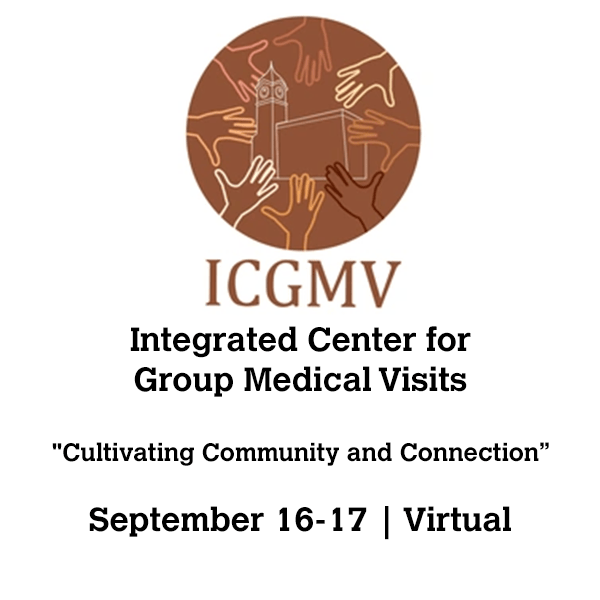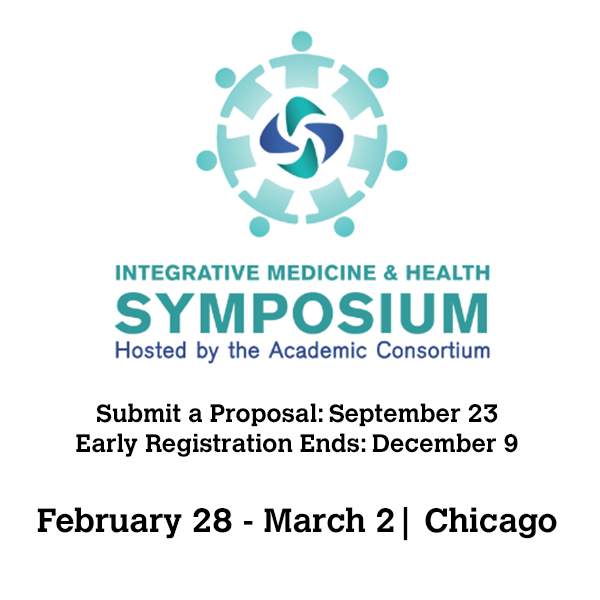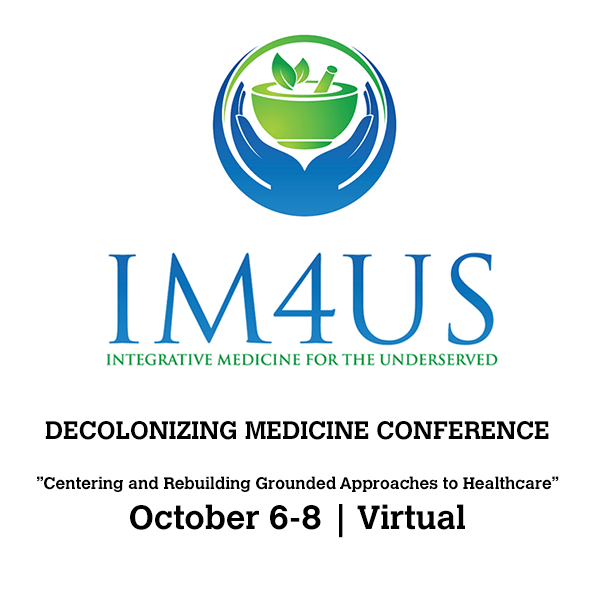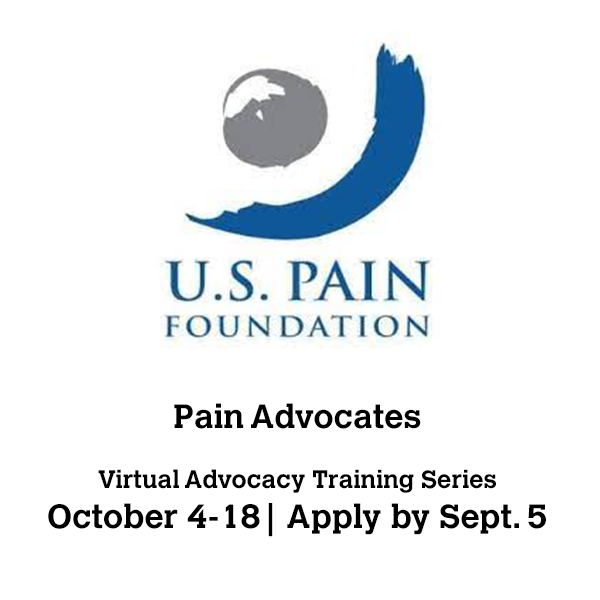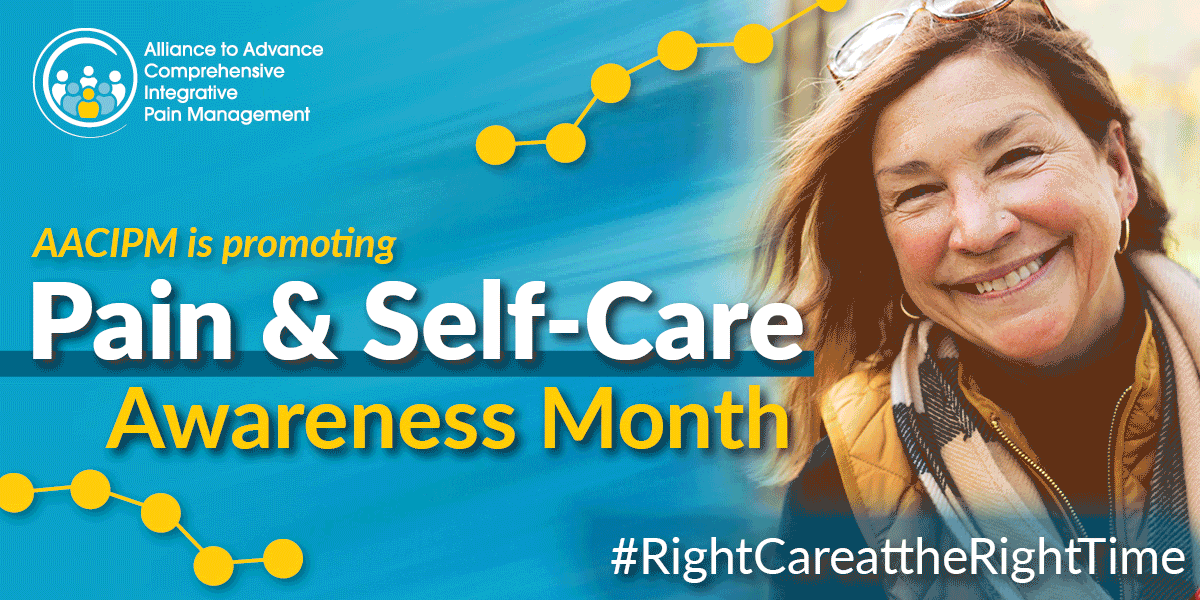
To promote both Pain Awareness Month and Self Care Awareness Month in September and beyond, AACIPM will be collaborating with many partners to spread awareness and deepen connections and understanding across the stakeholders.
We believe quality pain care is about getting the Right Care at the Right Time – leading to the best outcomes for all.
Join us in our efforts to build awareness by registering for our soon-to-be-released webinar series about exciting innovation and progress, checking out our newly vamped website, watching our social media (see hashtags and links below) and by sharing any or all of this information with your interested networks.
#RightCareattheRightTime #CIPM #SelfCareAwarenessMonth
#PainAwarenessMonth #HealthCareisSelfCare #WhatMattersToYou
Spotlight: Optum Labs Study Shows Vast Disparities in Pain Care Across Zip Codes

 After much anticipation, Optum Labs is releasing important research related to the vast disparities in pain care that exist across geographically dissimilar zip codes in the United States: Geographic variation in the treatment of spinal disorders: association with health care professional availability, and population socioeconomic status, race, and ethnicity. A retrospective cohort study.
After much anticipation, Optum Labs is releasing important research related to the vast disparities in pain care that exist across geographically dissimilar zip codes in the United States: Geographic variation in the treatment of spinal disorders: association with health care professional availability, and population socioeconomic status, race, and ethnicity. A retrospective cohort study.
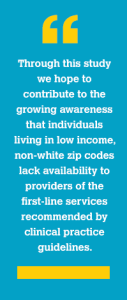 We recently discussed the new research with the paper’s lead author, AACIPM Advisory Committee member, David Elton, DC, Vice President of Musculoskeletal R&D at Optum Labs, to learn more about this important article, it’s intended purpose, and how it may impact the work of AACIPM’s stakeholders going forward.
We recently discussed the new research with the paper’s lead author, AACIPM Advisory Committee member, David Elton, DC, Vice President of Musculoskeletal R&D at Optum Labs, to learn more about this important article, it’s intended purpose, and how it may impact the work of AACIPM’s stakeholders going forward.
AACIPM: At AACIPM, we often discuss the importance of how social determinants of health must be fully considered when integrating a BioPsychoSocial approach to care for people with pain. Have you learned anything new in this regard from your involvement in this work?
David Elton: Implementing “evidence-based care”, while well-intended, is too high-level. Health care is local, even down to the 5-digit zip code. Strategies and tactics need to be fine-tuned to social determinants of health embedded within local environmental and population factors.
National Updates
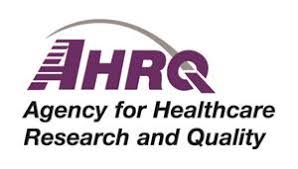 AHRQ Seeks Public Comment on Cervical Degenerative Disease Treatment
AHRQ Seeks Public Comment on Cervical Degenerative Disease Treatment
The Agency for Healthcare Research and Quality is seeking public comment related to treatments for cervical degenerative disease. The agency is seeking answers to a long list of key and contextual questions, including, among others:
- What is the prevalence of cervical degenerative disease with spinal cord compression in asymptomatic patients?
- What is the natural history of untreated spinal cord compression in patients with cervical degenerative disease?
- In patients with cervical degenerative disease, what are the comparative effectiveness and harms of surgical compared to non-operative treatment?
- In patients with radiographic spinal cord compression and mild to severe myelopathy, what is the effectiveness and harms of surgery versus non-operative treatment or no treatment? How do the effectiveness and harms vary by level of severity of myelopathy at the time of surgery?
Answers to the questions posed by AHRQ are due no later than September 12, 2022.
PCORI Seeks Applications and Nominations for Advisory Panels
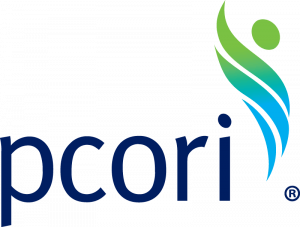 The Patient-Centered Outcomes Research Institute (PCORI) will be accepting applications and nominations for its five Advisory Panels for the 2022-23 cycle from September 1, 2022 to March 31, 2023. PCORI is the leading funder of patient-centered comparative clinical effectiveness research in the United States, and one way they include voices from across the healthcare community is through their Advisory Panels on:
The Patient-Centered Outcomes Research Institute (PCORI) will be accepting applications and nominations for its five Advisory Panels for the 2022-23 cycle from September 1, 2022 to March 31, 2023. PCORI is the leading funder of patient-centered comparative clinical effectiveness research in the United States, and one way they include voices from across the healthcare community is through their Advisory Panels on:
- Clinical Effectiveness and Decision Science
- Healthcare Delivery and Disparities Research
- Patient Engagement
- Clinical Trials
- Rare Disease
For more information on PCORI’s role in the future of health policy and why pain advocates and experts should consider getting involved, see AACIPM’s spotlight on Dr. Christine Goertz, AACIPM Advisory Committee member and outgoing PCORI Board Chair.
VA Highlights Complementary and Integrative Health, Coverage, and Evidence
 The U.S. Department of Veterans Affairs recently published a spotlight on complementary and integrative health (CIH), which has been a core part of VA health care since 2017. The approved CIH approaches are most often used to treat Veterans’ mental health, manage pain, and promote general wellness, and include: acupuncture; biofeedback; clinical hypnosis; massage; meditation; guided imagery; Tai Chi / Qi Gong; and, yoga.
The U.S. Department of Veterans Affairs recently published a spotlight on complementary and integrative health (CIH), which has been a core part of VA health care since 2017. The approved CIH approaches are most often used to treat Veterans’ mental health, manage pain, and promote general wellness, and include: acupuncture; biofeedback; clinical hypnosis; massage; meditation; guided imagery; Tai Chi / Qi Gong; and, yoga.
The VA has provided a number of evidentiary resources related to CIH approaches, including:
- Trial Outcomes for Massage: Caregiver-Assisted vs. Therapist-Treated (TOMCATT)
- Complementary and Integrative Health for Pain in the VA: A National Demonstration Project (NIH-VA-DOD Joint Initiative)
- Association of Complementary and Integrative Health Interventions with Opioid Use and Related Risks among Veterans with Musculoskeletal Disorders and PTSD
Trauma-Sensitive Yoga for Female Veterans with PTSD who Experienced Military Sexual Trauma
Timely AACIPM Action – CMS PFS 2023
CMS Developing New Payment Structure for Chronic Pain Management
 In response to comments from AACIPM and other advocates, Medicare is developing new coverage for chronic pain management that aims to facilitate coordination of integrative pain care services. With the help of a broad and diverse set of stakeholders, AACIPM will be submitting a collective response before the public comment period closes on September 6, 2022.
In response to comments from AACIPM and other advocates, Medicare is developing new coverage for chronic pain management that aims to facilitate coordination of integrative pain care services. With the help of a broad and diverse set of stakeholders, AACIPM will be submitting a collective response before the public comment period closes on September 6, 2022.
Federal Funds Available Related to Pain Management and Telehealth Research
The federal government is currently a number of pain-related research initiatives:
- Development of Therapies and Technologies Directed at Enhanced Pain Management (R43/R44 – Clinical Trial Required). Aims to support the development of therapies and technologies directed at enhanced pain management through the Small Business Innovation Research program. In addition, NIH is interested in new screening tools and models focused specifically on pain and development of pain therapies including digital tools.
- Development of Therapies and Technologies Directed at Enhanced Pain Management (R43/R44 – Clinical Trial Not Allowed). Focused on applications for improving pain treatment, including the development of new non-addictive medications and devices and objective pain measurement. In addition, NIH is interested in new screening tools and models focused specifically on pain and development of pain therapies including the development of digital health technologies associated with pain and serious mental illness or suicide.
- Notice of Special Interest: High Priority Pain Research. The National Center for Complementary and Integrative Health is inviting applications to focus on pain-related research topic areas that include remotely delivered interventions.
Notice of Special Interest: Mechanisms Underlying the Contribution of Sleep Disturbances to Pain. Issued by the National Institute of Child Health and Human Development, this aims to fund the investigation of the development and maintenance of chronic pain involve long-term changes in multiple integrated peripheral, spinal, and brain neural pain networks that interact to contribute to the individual experience of pain.
Partner Education Offerings
Click image below for more information
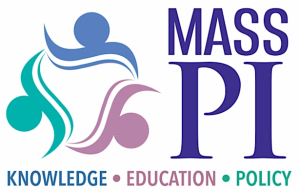 Massachusetts Pain Initiative Annual Pain Symposium
Massachusetts Pain Initiative Annual Pain Symposium
October 13 | 9:45am-3:30pm ET | Webinar
 Featuring:
Featuring:
The NIH HEAL Initiative: Combining the Power of Science and Community
Keynote speaker – Dr. Rebecca G. Baker, PhD, NIH HEAL Initiative Director
Continuing Education credits available. See registration page for details.
Message from the Director
 Wow, this month’s newsletter is full of important information for all of you. I encourage you to skim slowly, as there are many things you won’t want to miss.
Wow, this month’s newsletter is full of important information for all of you. I encourage you to skim slowly, as there are many things you won’t want to miss.
As September is beginning, we are rolling out AACIPM’s new webinar series in honor of Pain and Self Care Awareness Month, a new website and resources, a social media campaign and more – so keep your eye out for more on its way.
I also want to thank our Advisory Committee member, David Elton, and Optum Labs, for collaborating on the release of their new research study showing vast disparities in pain care across zip codes. There is important information for us to consider as we continue strategic collaboration across our participating groups.
There are many partner’s educational offerings mentioned in this issue – take a look. I know I’ll be participating in many.
And in addition to our National Updates, we are currently working hard to complete AACIPM’s collective response to CMS Physician Fee Schedule 2023 – it’s so great to see that our thoughtful work has been getting noticed.
As always, reach out with any feedback or to share additional resources you have.
Onward and Upward!
Amy
Relevant Reading
![]() Podcast: New treatments are offering hope to sickle cell disease patients, WAMU NPR, August 16
Podcast: New treatments are offering hope to sickle cell disease patients, WAMU NPR, August 16
Mindfulness ‘Changes the Biology’ of Pain, Medscape, August 15
Opioid Prescribing Is Down, Yet Alternative Pain Treatments Remain Underused, Practical Pain Management, August 10
How to talk to your doctors—and get them to actually listen, Fortune Well, August 8
Tune out pain: Agency and active engagement predict decreases in pain intensity after music listening, PLOS One, August 3
Reforming pain: Goodbye to one-size-fits-all solutions to rein in pain, Stanford Medicine, July 27
Special Report: Is the Biopsychosocial Model in Pain Management In or Out?, Practical Pain Management, July 6
Feedback
We welcome your input! What do you like? Do you have a contribution for an upcoming newsletter? Send us your comments, suggestions, or contributions.
